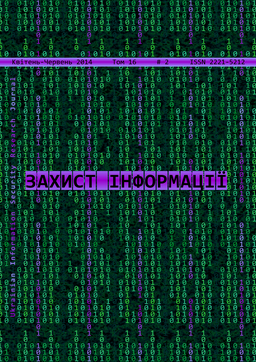Consistent eavesdropping attack of two eavesdroppers on the ping-pong protocol with GHZ-triplets of qubits
DOI:
https://doi.org/10.18372/2410-7840.16.6914Keywords:
quantum cryptography, a ping-pong protocol, three-qubit Greenberger – Horne – Zeilinger states, eavesdropping attack of two eavesdroppers, the probability of eavesdroppers' detection, eavesdroppers' amount of information,Abstract
In this paper has been analyzed the eavesdropping attackof two eavesdroppers on the ping-pong protocol withthree-qubit entangled Greenberger – Horne – Zeilingerstates. The expression for probability of attack detectionby legitimate users at attack of two eavesdroppers dependingon probabilities of detection them attacks separatelyare obtained. It is shown that an increase in thenumber of attackers in the quantum channel leads to anincrease in the probability of detecting these attacks bylegitimate users. The expressions for the maximum eavesdroppers'amount of information during a consistentattack of two eavesdroppers on the ping-pong protocolwith GHZ-triplets are obtained. It is indicated that themaximum eavesdroppers' amount of information determinedby the same expression as in the case of oneeavesdropper's attack, only the expression for the probabilityof attack detection is changed. It is shown that theping-pong protocol with GHZ-triplets is vulnerable toeavesdropping attack of two eavesdroppers not morethan to one eavesdropper's attack. It is shown that resultsof paper could be extend to the ping-pong protocols withn-qubit GHZ-states at any n.References
Deng F.G., Long G.L., Liu X.S. (2003) "Two-step quantum direct communication protocol using the Einstein–Podolsky–Rosen pair block", Physical Review A, V. 68, issue 4, 042317.
Wang C., Deng F.G., Long G.L. (2005) "Multi-step quantum secure direct communication using multi – particle Greenberger – Horne – Zeilinger state" Optics Communications, V. 253, issue 1, P. 15-20.
Jin X.-R., Ji X., Y.-Q. Zhang et al (2006) "Three-party quantum secure direct communication based on GHZ states" Physics Letters A, V. 354, № 1-2, P. 67-70.
Li X.-H., Li C.-Y., Deng F.-G. et al (2007) "Multiparty Quantum Remote Secret Conference" Chinese Physics Letters, V. 24, № 1, P. 23-26.
Chamoli A., Bhandari C.M. (2009) "Secure direct communication based on ping-pong protocol" Quantum Information Processing, V. 8, num. 4, P. 347-356.
Boström K., Felbinger T. (2002) "Deterministic secure direct communication using entanglement" Physical Review Letters, Vol. 89, issue 18, 187902.
Cai Q.-Y., Li B.-W. (2004) "Improving the capacity of the Boström – Felbinger protocol" Physical Review A, V. 69, issue 5, 054301.
Ostermeyer M., Walenta N. (2008) "On the implementation of a deterministic secure coding protocol using polarization entangled photons" Optics Communications, V. 281, issue 17, P. 4540-4544.
Vasiliu E.V. (2007) "Security analysis of the pingpong protocol with quantum dense coding" Scientific works of ONAT n.a. Popov, № 1, p. 32-38.
Vasiliu E.V., Vasiliu L.N. (2008) "Ping-pong protocol with tree- and four-qubit Greenberger-Horne-Zeilinger states" Works of the Odessa polytechnic university, No. 1(29), pp. 171-176.
Vasiliu E.V. (2008) "Analysis of attack on the pingpong protocol with Greenberger – Horne – Zeilinger’s triplets" Scientific works of ONAT n.a. Popov, № 1, pp. 15-24.
Vasiliu E.V. (2011) "Non-coherent attack on the pingpong protocol with completely pairs of qutrits", Quantum Information Processing V. 10, num. 2, P. 189-202.
Vasiliu E.V., Mamedov R.S. (2009) "Three new protocols of quantum secure communication with four-qubit cluster states" Digital, № 6, p. 94-103.
Mamedov R.S. (2011) "Ping-pong protocol of QKD with entangled four-qubit W-states" Ukrainian Information Security Research Journal, № 3(52), pp. 32-44.
Vasiliu Ye.V., Nikolayenko S.V. (2013) "Analyses of the consistent eavesdropping attack of several eavesdroppers on the ping-pong protocol with entangled pairs of qubits" Ukrainian Information Security Research Journal, № 1(58), pp. 39-48.
Vasiliu Ye., Nikolayenko S. (2009) "Synthesis of structure of quantum secure direct communication systems" Scientific works of ONAT n.a. Popov, № 1, pp. 83-91.
Downloads
Published
Issue
Section
License
Authors who publish with this journal agree to the following terms:- Authors retain copyright and grant the journal right of first publication with the work simultaneously licensed under a Creative Commons Attribution License that allows others to share the work with an acknowledgement of the work's authorship and initial publication in this journal.
- Authors are able to enter into separate, additional contractual arrangements for the non-exclusive distribution of the journal's published version of the work (e.g., post it to an institutional repository or publish it in a book), with an acknowledgement of its initial publication in this journal.
- Authors are permitted and encouraged to post their work online (e.g., in institutional repositories or on their website) prior to and during the submission process, as it can lead to productive exchanges, as well as earlier and greater citation of published work (See The Effect of Open Access).

